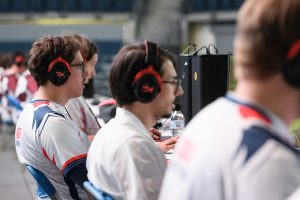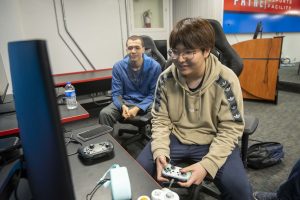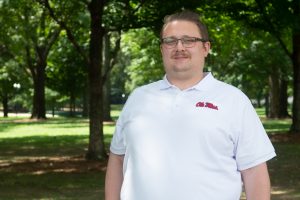
Members of the Ole Miss Esports team compete in the 2022 Esports Egg Bowl at The Sandy and John Black Pavilion at Ole Miss. Photo by Thomas Graning/Ole Miss Digital Imaging Services
OXFORD, Miss. – With the awarding of $95,000 in scholarships this semester to new students, the University of Mississippi has invested in not just the game, but in the career path of esports.
John McDermott, director of esports programs, awarded 12 recruits with scholarships from donors and from the university. The family of alumnus Abb Payne, who has supported esports at Ole Miss in the past, contributed $15,000 to the fund and the university allotted the remaining $80,000 from its general fund.
The investment shows that Ole Miss is dedicated to the burgeoning field and business of esports, said Tony Ammeter, associate provost and director of outreach and continuing studies.
“When we say this field is growing, we mean at an exceptional rate and across multiple disciplines,” Ammeter said. “At this point, it’s bigger than the Hollywood film industry, as well as the TV or radio industries.
“It’s not often you find a field that is so connected to so many academic disciplines and provides so many opportunities.”
Among the recruits are professional and former professional gamers, championship winners and potential leaders of the program, McDermott said.
Unlike many esports programs, which are housed in small private universities, UM has the draw of a major, R-1 university education to draw players, McDermott said.
“When you look at a university like this, it’s easy to attract attention not only to help these students get an education but to help them follow their dreams,” he said. “There are opportunities to develop inroads in the industry here.”
Ammeter noted that professionals can work in esports marketing, graphic design, management and even the business of online sports. In contrast to attitudes in years past – when online gaming was considered a hobby – it serves as a potential career path, Ammeter said.
The university must, in turn, prepare students for those careers.

Students practice their gaming skills in the renovated esports facility at the Yerby Conference Center. Photo by Srijita Chattopadhyay/Ole Miss Digital Imaging Services
A new, interdisciplinary minor in esports is working its way through academic council with the tentative goal of opening to students this fall. That minor, which offers six courses from the School of Business Administration and is attracting courses from other academic units, and the recent investment in online gaming talent, will show that the university is serious about esports as a viable career, Ammeter said.
Scott Reynolds, an incoming junior in economics and one of the awardees, said the fact that the university is embracing its esports program is one of the main reasons he chose to become a Rebel.
Before joining the professional esports organization Team Liquid and playing at the pro level between 2020 and 2022, the Tallahassee native was on another university esports team in Florida. That team, which never advanced past the club level during his time there, didn’t have the university’s backing, he said.
“I never understood why they didn’t see the potential,” Reynolds said. “To see a school as big as Ole Miss actually invest in the esports team, that was one of the main things that makes me believe collegiate esports is only in its beginning.
“It’s only a matter of time before this is something every university wants in on.”

John McDermott, esports director. Photo by Kevin Bain/Ole Miss Digital Imaging Services
By attracting high-level talent, such as Reynolds and other players in the recruiting class, Ole Miss will grow its reputation as a premier esports facility, and in turn recruit more students who are interested in the field, McDermott and Ammeter agreed.
“As much as we want to win, we also want to take this opportunity to show students that what they’re interested in, they can pursue here,” Ammeter said. “Every university has a goal of recruiting good students that need what we can teach them. We are many things to many people, and this is an important thing for us to be.”
McDermott echoed Reynolds’ point that college esports is in its infancy and will only grow from here. While other universities strive to catch up, McDermott said he wants Ole Miss to be at the forefront.
“Ole Miss was the first school in the SEC to fully sponsor and back esports,” he said. “The SEC leads the way in academics and athletics. We’ve already seen other schools follow suit, but we want to use this head start the university gave us and build a program that our children and grandchildren can be a part of.”